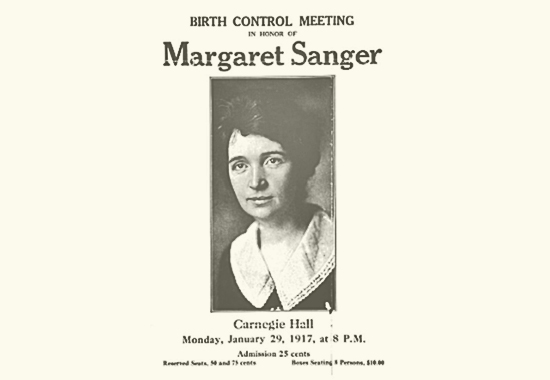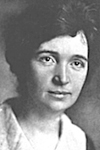|

BIRTH CONTROL MEETING FLYER -
MARGARET SANGER 1917
The Children's Era

 |
Mr. Chairman,
Ladies and Gentlemen: |
My subject is "The Children's Era." "The
Children's Era!" This makes me think of Ellen
Key's book--The Century of the Child. Ellen Key
hoped that this twentieth century was to be the
century of the child. The twentieth century, she
said, would see this old world of ours converted
into a beautiful garden of children. Well, we
have already lived through a quarter of this
twentieth century. What steps have we taken
toward making it the century of the child? So
far, very, very few.
Why does the Children's Era still remain a dream
of the dim and distant future? Why has so little
been accomplished?--in spite of all our
acknowledged love of children, all our
generosity, all our good-will, all the enormous
spending of millions on philanthropy and
charities, all our warm-hearted sentiment, all
our incessant activity and social consciousness?
Why?
Before you can cultivate a garden, you must know
something about gardening. You have got to give
your seeds a proper soil in which to grow. You
have got to give them sunlight and fresh air.
You have got to give them space and the
opportunity (if they are to lift their flowers
to the sun), to strike their roots deep into
that soil. And always--do not forget this--you
have got to fight weeds. You cannot have a
garden, if you let weeds overrun it. So, if we
want to make this world a garden for children,
we must first of all learn the lesson of the
gardener.
So far we have not been gardeners. We have only
been a sort of silly reception committee. A
reception committee at the Grand Central Station
of life. Trainload after trainload of children
are coming in, day and night--nameless refugees
arriving out of the Nowhere into the Here.
Trainload after trainload--many unwelcome,
unwanted, unprepared for, unknown, without
baggage, without passports, most of them without
pedigrees. These unlimited hordes of refugees
arrive in such numbers that the reception
committee is thrown into a panic--a panic of
activity. The reception committee arouses itself
heroically, establishes emergency measures: milk
stations, maternity centers, settlement houses,
playgrounds, orphanages, welfare leagues and
every conceivable kind of charitable effort. But
still trainloads of children keep on
coming--human weeds crop up that spread so fast
in this sinister struggle for existence, that
the overworked committee becomes exhausted,
inefficient and can think of no way out.
When we protest against this immeasurable,
meaningless waste of motherhood and child-life;
when we protest against the ever-mounting cost
to the world of asylums, prisons, homes for the
feeble-minded and such institutions for the
unfit, when we protest against the disorder and
chaos and tragedy of modern life, when we point
out the biological corruption that is destroying
the very heart of American life, we are told
that we are making merely an "emotional" appeal.
When we point the one immediate practical way
toward order and beauty in society, the only way
to lay the foundations of a society composed of
happy children, happy women and happy men, they
call this idea indecent and immoral.
It is not enough to clean up the filth and
disorder of our overcrowded cities. It is not
enough to stop the evil of Child Labor--even if
we could! It is not enough to decrease the rate
of infantile mortality. It is not enough to open
playgrounds, and build more public schools in
which we can standardize the minds of the young.
It is not enough, to throw millions upon
millions of dollars into charities and
philanthropies. Don't deceive ourselves that by
so doing so we are making the world "Safe for
Children."
Those of you who have followed the sessions of
this Conference must, I am sure, agree with me
that the first real step toward the creation of
a Children's Era must lie in providing the
conditions of healthy life for children not only
before birth but even more imperatively before
conception. Human society must protect its
children--yes, but prenatal care is most
essential! The child-to-be, as yet not called
into being, has rights no less imperative.
We have learned in the preceding sessions of
this Conference that, if we wish to produce
strong and sturdy children, the embryo must grow
in a chemically healthy medium. The blood stream
of the mother must be chemically normal. Worry,
strain, shock, unhappiness, enforced maternity,
may all poison the blood of the enslaved mother.
This chemically poisoned blood may produce a
defective baby--a child foredoomed to idiocy, or
feeble-mindedness, crime, or failure.
Do I exaggerate? Am I taking a rare exception
and making it a general rule? Our opponents
declare that children are conceived in love, and
that every new-born baby converts its parents to
love and unselfishness. My answer is to point to
the asylums, the hospitals, the ever-growing
institutions for the unfit. Look into the family
history of those who are feeble-minded; or
behind the bars of jails and prisons. Trace the
family histories; find out the conditions under
which they were conceived and born, before you
attempt to persuade us that reckless breeding
has nothing to do with these grave questions.
There is only one way out. We have got to fight
for the health and happiness of the Unborn
Child. And to do that in a practical, tangible
way, we have got to free women from enforced,
enslaved maternity. There can be no hope for the
future of civilization, no certainty of racial
salvation, until every woman can decide for
herself whether she will or will not become a
mother and when and how many children she cares
to bring into the world. That is the first step.
I would like to suggest Civil Service
examinations for parenthood! Prospective parents
after such an examination would be given a
parenthood licence, proving that they are
physically and mentally fit to be the fathers
and mothers of the next generation.
This is an interesting idea--but then arises the
questions "Who is to decide?" \"Would there be a
jury, like the play jury?" Would a Republican
administration give parenthood permits only to
Republicans--or perhaps only to Democrats? The
more you think of governmental interference, the
less it works out. Take this plan of civil
service examination for parenthood. It suggests
Prohibition: there might even be bootlegging in
babies!
No, I doubt the advisability of governmental
sanction. The problem of bringing children into
the world ought to be decided by those most
seriously involved--those who run the greatest
risks; in the last analysis--by the mother and
the child. If there is going to be any Civil
Service examination, let it be conducted by the
Unborn Child, the Child-to-be.
Just try for a moment to picture the
possibilities of such an examination.
When you want a cook or housemaid, you go to an
employment bureau. You have to answer questions.
You have to exchange references. You have to
persuade the talented cook that you conduct a
proper well-run household. Children ought to
have at least the same privilege as cooks.
Sometimes in idle moments I like to think it
would be a very good scheme to have a bureau of
the Child-to-be.
At such a bureau of the unborn, the wise child
might be able to find out a few things about its
father--and its mother. Just think for a moment
of this bureau where prospective parents might
apply for a baby. Think of the questions they
would be asked by the agent of the unborn or by
the baby itself.
First: "Mr. Father, a baby is an expensive
luxury. Can you really afford one?"
"Have you paid for your last baby yet?"
"How many children have you already? Six? You
must have your hands full. Can you take care of
so many?"
"Do you look upon children as a reward--or a
penalty?"
"How are your ductless glands--well balanced?"
"Can you provide a happy home for one? A sunny
nursery? Proper food?"
"What's that you say? Ten children already? Two
dark rooms in the slums?"
"No, thank you! I don't care to be born at all
if I cannot be well-born. Good-bye!"
And if we could organize a society for the
prevention of cruelty to unborn children, we
would make it a law that children should be
brought into the world only when they were
welcome, invited and wanted; that they would
arrive with a clean bill of health and heritage;
that they would possess healthy, happy,
well-mated and mature parents.
And there would be certain conditions of
circumstances which would preclude parenthood.
These conditions, the presence of which would
make parenthood a crime, are the following:
1.
Transmissible disease
2. Temporary disease
3. Subnormal children already in the family
4. Space out between births
5. Twenty-three years as a minimum age for
parents
6. Economic circumstances adequate
7. Spiritual harmony between parents.
In conclusion, let me repeat:
We are not trying to establish a dictatorship
over parents. We want to free women from
enslaved and unwilling motherhood. We are
fighting for the emancipation of the mothers of
the world, of the children of the world, and the
children to be. We want to create a real Century
of the Child--to usher in a Children's Era. We
can do this by handing the terrific gift of life
in bodies fit and perfect as can be fashioned.
Help us to make this Conference which has
aroused so much interest the turning point
toward this era. Only so can you help in the
creation of the future.

The
Margaret Sanger Papers Project, New York
University, has the copyright to this speech
transcript. Used with permission.
More History
|
|